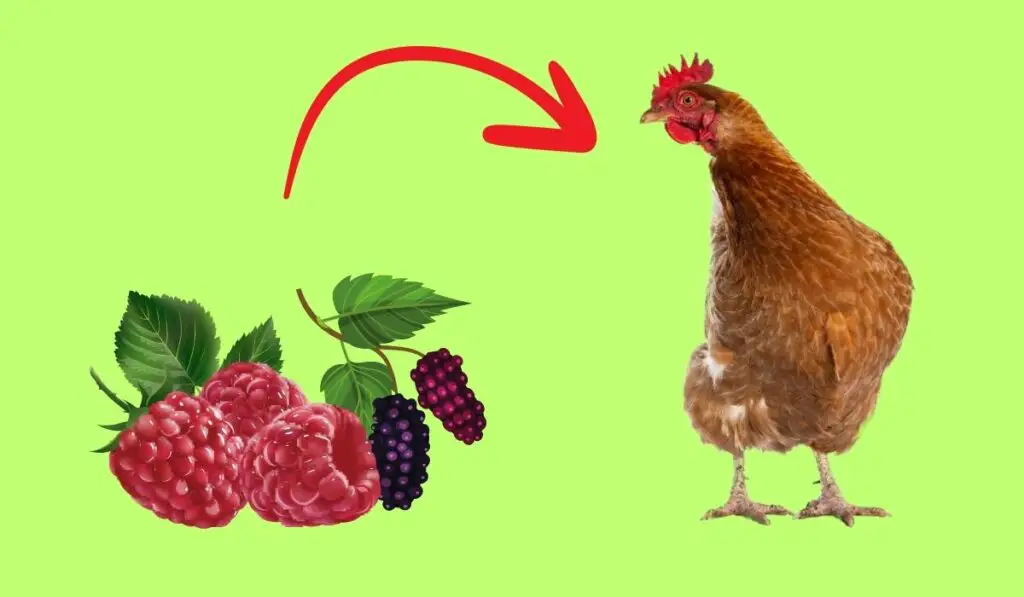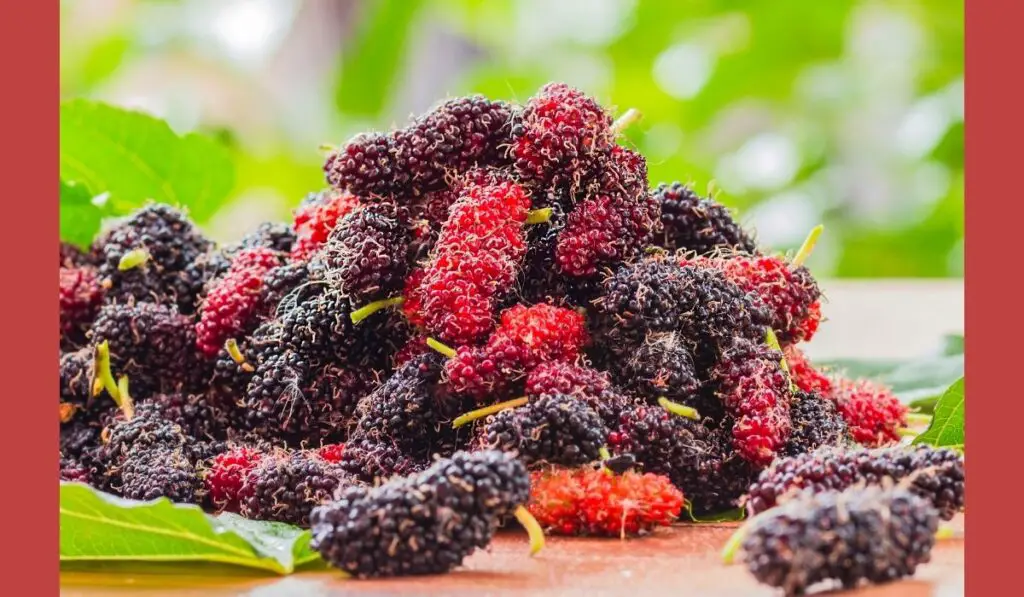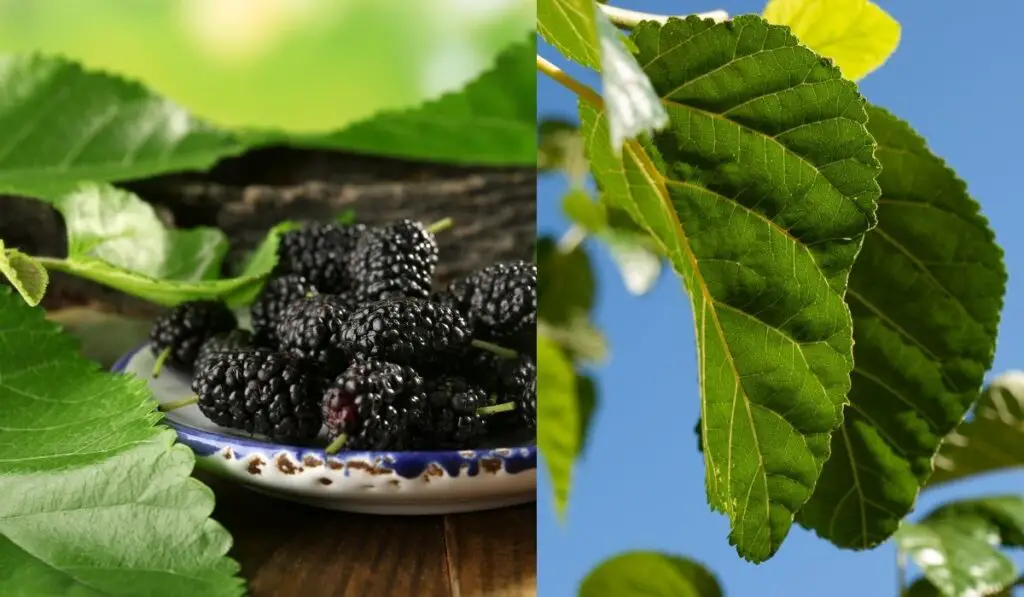I keep hens in my small yard along with other birds because raising chickens is a hobby many individuals like. As a result of their friendliness and intelligence, I spent most of my time with them. So, instead of giving my hens their daily pellet feed, as a poultry owner, I frequently give them treats of fruits and veggies. Today, we’ll discuss the Mulberry fruit because a healthy and tasty meal is equally necessary for poultry friends. Are mulberries safe for hens to eat?
I will offer all the details regarding this subject as a chicken owner in the hopes that they will be helpful to you if you raise hens as I do.
Table of Contents
What are mulberries?
Mulberries are a delectable fruit that grows on either silkworm or mulberry trees. However mulberries are present in various kinds, but there are only three types of mulberries that people mostly eat. These are black, red, and white mulberry, widely used worldwide. The mulberries are fleshy, juicy, and delectably sweet. Their flavor is like grapefruit.
Can chickens eat mulberries?

Chickens can consume the mulberries safely. It is a delicious fruit for your poultry birds. It provides your chicken with a rich source of vitamin C and is also beneficial for your flock due to its high-water content. However, you should only give the mulberries to fowl companions as an occasional treat because excessive consumption is a laxative and causes the chicken poop to turn purple.
Are mulberries okay for chickens to consume?
Mulberries are entirely safe for hens to consume. There is no dangerous substance present in it. Therefore, you can feed it to your flock without any issues.
Most chicken owners need to be more severe about their chickens’ diet and feed them everything, whether wrong or good, for backyard hens. It is a common mistake that most poultry owners make, and they provide them with everything without knowing whether it is safe or not. It would help if you never fed anything to hens without checking it. If the food is safe, share it with the poultry, and if the food is terrible and moldy, avoid giving it to your flock.
The Health Benefits of Feeding Mulberries to Chickens:
Mulberries contain many healthy nutrients such as minerals, antioxidants, proteins, lipids, and vitamins. This fruit is high in vitamins A, K, and C. So, explore the benefits of feeding mulberries to hens.
- Mulberry is beneficial to digestion. The fiber content in mulberries helps improve your feathered friends’ digestive systems. It allows the food to move quickly into the digestive tract. So, give mulberry to chickens for their proper digestive work only as an occasion.
- Mulberries aid in relieving constipation in your fowl buddies.
- A daily intake of mulberries also helps maintain chickens’ weight.
- Mulberries contain nutrients that help chickens maintain a healthy level of bad cholesterol in their bodies.
- The mulberry fruit protects chickens from heart diseases and improves your flock’s heart health.
- The vitamin C content in mulberries is beneficial for the strength of the chicken immunity system. The alkaloids in mulberries are good for stimulating the immune system.
- Mulberries aid in blood sugar regulation in hens.
- The intake of mulberry fruits helps the blood circulation in the whole body of the hen.
- Iron content is very beneficial in producing red blood cells. It is also helpful for the treatment of anemic diseases.
- Mulberries aid in the good vision of your chicken due to the presence of zeaxanthin, which helps to reduce oxidative stress in cells from the eyes of the chicken. It also protects the retina from harmful rays.
How can I introduce mulberries to chickens?

As you know, mulberries are highly nutrias and beneficial for your chickens. So, let’s learn how to feed these fruit chickens.
- Take a handful of mulberries and toss them into the chicken coop so they can devour them.
- You can also mix the mulberries into the chicken’s favorite grains.
- Spread it in the garden or yard where the hens are playing.
- Then mix the mulberries with the yogurt and serve this delicious treat to your fowl buddies.
How often do I feed mulberries to my chickens?
The delicious mulberry fruit benefits your backyard hens, but using this fruit as a treat is unnecessary. You can feed the mulberries to your picky birds only once or twice a month. If you include this fruit in their daily pellet feed, your chicken will be deficient in other essential nutrients for growth and development. As a result, the best approach is only to serve mulberries as an occasional treat to your flock.
How much mulberry is okay for chickens to consume?

As we know, mulberry fruit does not contain all the nutrients and vitamins your chicken requires. So, it is essential that you only give 10% of this fruit as a treat to your chickens. Almost 5 to 6 mulberries are okay for the consumption of your poultry friends.
What is the risk of feeding too many mulberries to chickens?
Mulberries are a very healthy and delectable fruit, but they also contain some drawbacks, which are listed below:
- The high consumption of mulberries can cause diarrhea in your backyard picky birds and cause vomiting.
- The chickens’ digestive system did not work correctly due to a large intake of mulberry fruit.
- The mulberry fruit contains a toxic substance called oxalic acid. If your chickens can consume it in large amounts, it becomes dangerous.
- As a result of the high sugar content, the overconsumption of this mulberry fruit leads your hen to obesity, and you know that obesity causes many health problems.
So, it must only feed to your fowl companions in small quantities.
Can chickens eat mulberry leaves?

Some research shows that mulberry leaves are unsafe for fowl hens because the white sap known as latex is present in them, a very harmful and toxic substance for humans and chickens. If your chicken eats it in small quantities, it may cause stomach irritation and digestive problems.
Some poultry owners say that mulberry is safe for feathered birds to eat because it provides many health advantages to your hens.
I never use mulberry leaves for my hens except for mulberry fruit. If you want to introduce the mulberry leaves to hen, serve them to your fowl friends. If they show no interest in eating the leaves, then never feed them to them. Because hens naturally know what is dangerous for their health or what is good for them.
These are some healthy foods for chickens to eat:
Oatmeal
If you want to make your chicken feed healthier and nutrias, then oatmeal is an excellent choice to add to your hens’ feed. Oats are the main ingredient necessary for the meal of your backyard poultry birds because they contain an adequate number of proteins and healthy nutrients, which play an essential role in boosting chickens’ health.
Herbs
You have grown many herbs in this area if you have a yard. Your hens will also be interested in consuming these herbs while playing or roaming in the yard. Although all spices are not suitable for your poultry friends, some kinds of herbs are beneficial for your fowl buddies. For example, mint and clover provide many health benefits to your flock.
Pumpkin
It is a good idea if you are thinking of serving the pumpkin to your poultry friends. Pumpkins are healthy treats for poultry friends. You can feed both raw and cooked pumpkins to your backyard hens. The seeds are also safe for the consumption of your fowl hens. Your fowl companions love to eat pumpkins.
Finally, words
Can chickens eat mulberries? Yes, hens love to consume mulberries like other fruits and veggies. Mulberries are great for the health of hens. It would help if you always used mulberries in moderation for your picky birds to keep them safe from illnesses caused by excessive consumption of this fruit.
FAQs
Can chicks eat mulberries?
The direct answer is no! You did not use mulberries for your baby chicks because they do not contain an abundance of protein, which your chickens need at the early stage of their life.
Can chickens eat unripe mulberries?
Never feed unripe mulberries to your poultry friends because the toxic compound known as cyanide is present in the unripe mulberries. So, you must avoid feeding it to your fowl companions.
Is the purple poop of chickens an alarm?
No, it is normal, and you do not need to worry. Hence, it does not cause any alarm or alert about the lousy condition of hens.



